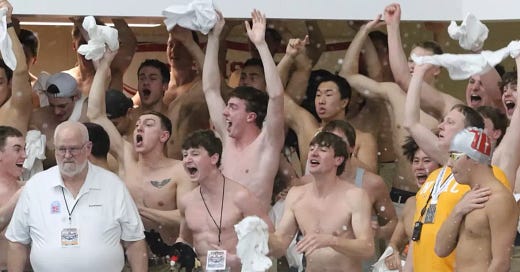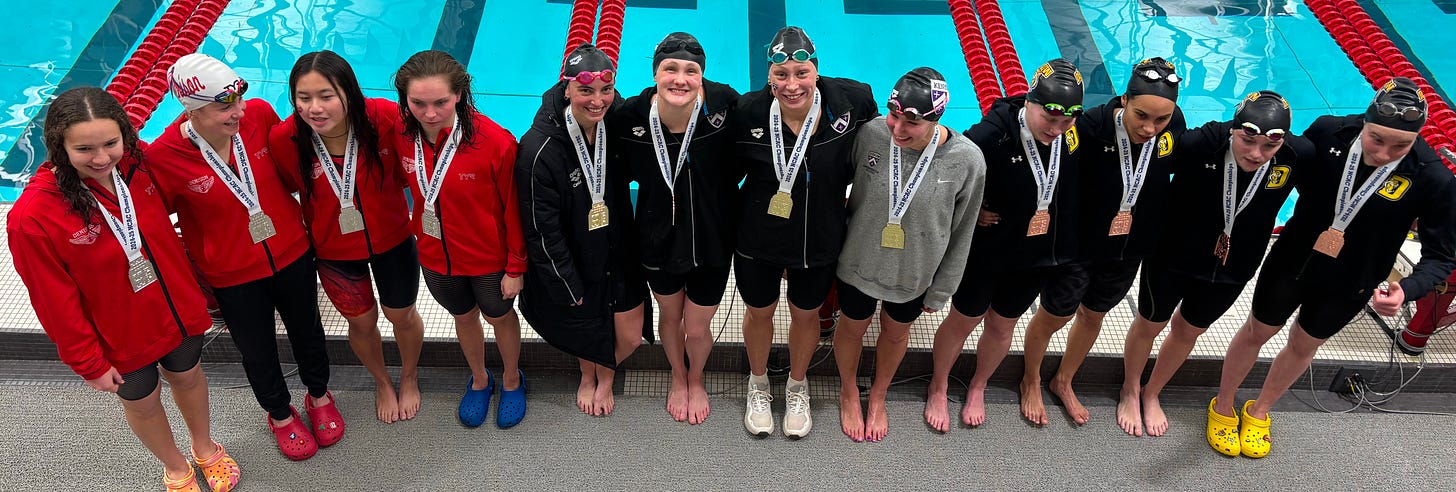Men
Horse race overview
Team and points:
Denison, 716
Kenyon, 565
This is playing out as expected. Denison, the strongest men’s team in Division III, is up against a Kenyon squad in a rebuilding year—talented, full of potential, but not deep enough to match Big Red.
Events
Denison entered the day with a 16-point lead from their relay wins the night before.
They looked poised to extend it in the 500 Free, placing three swimmers in the final who went 1-2-3—stacking up 96 points. But Kenyon countered with four swimmers finishing 4-5-6-9, racking up 108.
It’s a strange sight—one team sweeping the podium yet losing ground. But in a championship final, nothing is more overrated than winning an event. And nothing is more powerful than sheer numbers in the finals.1
Denison’s lead shrank to just four points after the 500 Free—Denison 236, Kenyon 232.
But then came the 200 IM, and with it, a turning point. Seven of the nine A Final slots belonged to Denison. They finished 1-2-3-4-7-8-9, with Patrick Daly (again) breaking the conference record. Kenyon had five swimmers spread between the A and B Finals, but with Denison stacking the points-heavy A Final, the damage was done. Denison added 88 points to their lead.
Kenyon clawed back some ground in the 50 Free. Djordje Dragojlovich’s 19.99 win…those sub-20 second 50 Frees…it just never gets old. Kenyon’s first-years, Neil Abrahamson and Arjunvee Gupta, chipped in 41 points in the B Final. With a 5-4 advantage in total finalists, Kenyon outscored Denison 130-114. A solid +16 swing—but the sting of that 200 IM still lingered.
You know when finishing 1-2-3 is not overrated? When the other team enters only one athlete. In men’s 1 meter diving, Denison took the top three spots for 96 points. The lone Kenyon diver finished fourth, contributing a healthy 29 points. But…no match for Denison’s depth.
Denison followed with a dominant win in the men’s 400 Medley Relay, setting a new team and conference record at 3:12.17 (Congratulations sophomore transfer Jack Hill, seniors Elijah Venos and Christian Narcelles, and first-year Nick Hensel). Kenyon’s Roman Savage posted the fastest fly split of the event, more than a second quicker than anyone else. A small victory in an otherwise decisive Denison performance.
Denison finished the night ahead of the Lords by 151 points.
Women
Horse race overview
Team and points:
Kenyon, 721
Denison, 685
Yeah, that’s pretty close.
Events
Diving gave Kenyon a 61 point advantage on Wednesday night and Big Red took back 16 points by winning both the 800 Free and the 200 Medley relays.
Denison junior Quinn Brown generates a lot of chatter in the Kenyon seating section, mostly along the lines of ‘when did she become so fast?’ The answer seems to be ‘right now.’2 Ms. Brown won the 500 Free with a record setting time of 4:47.51. That is a Denison team record, a Trumbull aquatic center record, and an NCAC record.
The next three finishers were from Kenyon, and both Molly Haag and Bengisu Caymaz finished under 4:50. The last time a Division III team had two athletes under 4:50 in women’s 500 Free was the 2018 Emory squad (Cindy Cheng and Rebecca Upton).
Kenyon first-year Nora Lee Brown finished in 4:58.68. Denison’s Taryn Wisner (national champion in 500 Free in 2022) finished in fifth and her teammate Erika Schraber finished in seventh. Given the bounce-back performance from Kenyon’s Ceyda Yazici (6th place) and solid swim from Kenyon first-year Sophia Giordano (ninth place), Kenyon had no trouble clearing 30 points in this event. (It could have been worse for Denison, but senior Annie Pfeufer won the B final.)
Kenyon - 422
Denison - 347
IMs are always the most fun to watch because swimmers vary so dramatically in their relative speed from stroke to stroke. Kenyon’s Jennah Fadely and Gabby Wei were not in the lead at the end of the backstroke leg and they were a clear 1-2 after the breaststroke leg. Along with sophomore Ashlyn Widmer and first-year Kelsie Van Eldik, Kenyon finished 1-2-6-7 (worth 119 points). Denison finished 3-4-5-10 (worth 109 points).
Kenyon - 541
Denison - 456
Then came the 50 Free—the event we flagged as Denison’s biggest opportunity to cut into Kenyon’s lead. Denison came to the finals with six swimmers to Kenyon’s four, outscoring them 167-110. Seniors Grace Kadlecik and Amber Croonquist went 1-2, while Kenyon’s top sprinters, Sydney Geboy and Lisa Torrecillas-Joualt, followed in 3rd and 4th. Just like that, Kenyon’s lead was less intimidating.
Kenyon - 651
Denison - 623
Heading into the 400 Medley Relay, things didn’t look promising for Kenyon. Gwen Eisenbeis, a relatively untested backstroke lead-off, faced Jasmine Park, the Denison record holder in the 100 Back. The breaststroke leg, however, was a clear advantage for Kenyon—no disrespect to Denison’s elite Drue Thielking, but Jennah Fadely is the best sprint breaststroker in Division III history.
The butterfly leg was a question mark. Denison’s Emma Pritchett consistently goes sub-55, while Kenyon’s Celia Ford had struggled in the 200 Medley Relay the night before. And then there was the anchor leg—Sydney Geboy had reason to be tired, having just finished swimming a 23.43 in the 50 Free. And she was facing Denison’s Emily Harris, an elite freestyle closer.
So obviously the Kenyon Ladies answered with a new NCAC record in the 400 Medley Relay. Gwen Eisenbeis held off Jasmine Park on the opening leg, Jennah Fadely widened the gap, and Celia Ford’s butterfly was fast enough to keep Kenyon ahead. Sydney Geboy sealed the win—looking not the least bit tired.
Kenyon, 721
Denison, 685
OK - let’s all take a breath. We are not saying that winning is without value. We are saying it is overrated.
Winning is the single biggest driver of crowd reaction. But it is not common to hear people cheering because the fourth swimmer from their team in the event finished ninth, even when that ninth place finish - as in the example above - is the reason why your team actually won the event (scored more points than your opponent).
The marginal value of finishing first is real, but it is swamped by the marginal value of adding one more swimmer to either the A or B finals. At NCACs, the difference in points between finishing first or ninth is 11 points. That is less than the points value of a single swimmer finishing last in the B final (18th place, worth 12 points)
Take with a grain of salt but SwimCloud rankings had Ms. Brown ranked 11th on her team in her first-year, 4th as a sophomore, and 1st this season.






This is awesome! Love the in depth explanation of the scoring! Now I have a better appreciation of how significant team depth is to winning the conference championship!